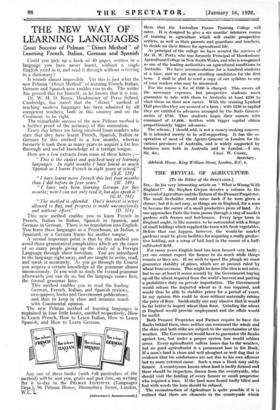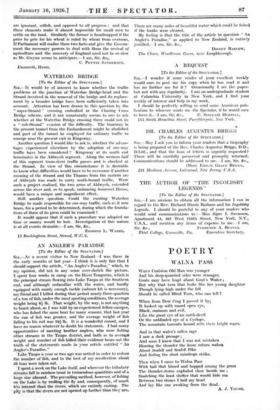THE REVIVAL OF AGRICULTURE [To the Editor of the SPECTATOR.]
SIR,—In his very interesting article on " What is Wrong With England ?" Mr. Stephen Gwynn devotes a column to the Revival of Agriculture and the Return of the Peasant Proprietor. The small freeholder would come back if he were given a chance, but it is not easy, as things are in England, for a man to become the owner of a small productive piece of land. As one approaches Paris the train passes through a ring of market gardens with frames and hot-houses. Every large town in England ought, in like manner, to be surrounded with a fringe of small holdings which supplied the town with fresh vegetables. Before that can happen, however, the would-be market gardener must be given facilities for acquiring a really produc- tive holding, not a scrap of bad land in the corner of a half- cultivated field.
For many years English land has been farmed very badly ; yet one cannot expect the farmer to do much while things remain as they are. If we wish to speed the plough we must guarantee stability of prices, which are at present ruled by wheat from overseas. This might be done (the idea is not mine, but to me at least it seems sound) by the Government buying up all the wheat required from the world's harvest and putting a prohibitive duty on private importation. The Government would release the imported wheat as it was required, and would thus be able to stabilize prices for a period of years. In my opinion this could be done without materially raising the price of flour. Incidentally one may observe that it would be far better to import wheat than flour. Grinding the wheat in England would provide employment and the offals would be useful.
Both Peasant Proprietor and Farmer require to have the Banks behind them, since neither can command the winds and the skies and both alike are subject to the uncertainties of the weather. The Government would have to guarantee the Banks against loss, but under a proper system loss would seldom occur. Every agriculturist suffers losses due to the weather, but no good agriculturist is a permanent loss to his Bank; If a man's land is clean and well ploughed or well dug that is evidence that his misfortunes are not due to his own idleness but to some external cause. Such a man a Bank may safely finance A countryman knows when land is badly farmed and there should be inspectors, drawn from the countryside, who should visit the holding of every farmer or small proprietor who required a loan. If the land were found badly tilled and foul with weeds the loan should be refused.
The reconstruction of Agriculture is quite possible if it is realized that there are elements in the countryside which
are ignorant, selfish, and opposed to all progress ; and that these elements make it almost impossible for small men to settle on the land. Similarly the farmer is handicapped if the price he gets for his wheat is ruled by wheat from overseas. If Parliament will realize these two facts and give the Govern- ment the necessary powers to deal with them the revival of agriculture and the recovery of England need not be so slow as Mr. Gwynn seems to anticipate.—I am, Sir, &c.,
C. POYNTZ SANDERSON.
Emsworth, Hants.















































 Previous page
Previous page